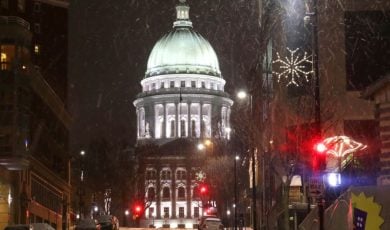The American Gaming Association (AGA) has released a study revealing that 90% of sweepstakes casino users believe they’re gambling when they play sweeps.
The study also found that many offshore sweepstakes casinos market aggressively in the United States, accounting for half of all real-money online casino ads viewed in early 2025.
“The data is clear,” AGA Vice President of Government Relations Tres York said in a statement. “Consumers see right through the ‘sweepstakes’ casino facade and they’re calling it what it is: gambling.”
The AGA based its findings on figures from data firm Sensor Tower. The study surveyed 2,250 users of real-money, social and sweepstakes casinos.
Majority of Players Say They’re Gambling with Sweeps
While sweepstakes casinos may be seen by potential users as a free way to experience an online casino, the AGA’s study suggests otherwise, based on input from sweepstakes casino users:
- 90% believe they’re gambling
- 80% say they spend money monthly to play sweepstakes casinos, and around half spend money weekly
- 69% say that sweepstakes casinos are a place to wager real money
- 68% say the main reason they play is to win money
In light of this data, the AGA argues that sweepstakes casinos are real-money platforms and should be regulated as such.
“These operators present themselves like legal, regulated platforms – but they operate outside the law and regulation,” York said.
Because sweepstakes casinos typically operate outside state-level regulations for online casinos, consumers are at risk.
“There are few if any responsible gaming tools, no regulatory oversight, and no consumer protections,” York said. “It’s a dangerous subterfuge that puts players at real risk.”
Another factor fueling the urgency to regulate sweepstakes casinos: The platforms acquired new customers at three times the rate of online casinos from July 2024 to December 2024, according to a recent study from Optimove.
Crossroads Ahead: Ban, Regulate or Exit for Sweeps Casinos
It’s unclear at this point, but several outcomes are likely:
- States pass laws to ban sweepstakes casinos
- States pass laws that treat sweepstakes casinos like regulated online casinos
- Sweepstakes casinos leave states
The first outcome is already unfolding. For example, Connecticut, Delaware, Maryland, Michigan, Montana, Nevada, Washington and West Virginia have either banned sweeps or strengthened their sweepstakes regulations. New Jersey is expected to enact a ban on Aug. 14.
California lawmakers are moving a bill through the legislature that would ban sweepstakes casinos in the Golden State. Louisiana lawmakers passed a bill that would’ve outlawed sweepstakes casinos, but fell short of legalization when Gov. Jeff Landry vetoed the bill in June.
Notably, half of the states with some type of ban on or regulation against sweepstakes casinos have legal online casinos. These states have a vested interest in eliminating unregulated competition, as operator revenue lost to sweeps casinos means lost gaming tax revenue for the state.
SPGA Pushes Against Wave of Anti-Sweeps Sentiment
As states take action against sweepstakes casinos, the Social & Promotional Games Association, an industry advocate, is speaking out. When New York Attorney General Letitia James called sweeps casinos illegal and dangerous just days before the state outlawed them, the SPGA fired back in a statement, saying,
“sweepstakes promotions are not gambling under federal law and are legally permitted in the overwhelming majority of U.S. states.”
The SPGA also criticized New York for not working “collaboratively” to find a regulated solution for sweepstakes casinos — a sentiment the group has expressed when other states, such as Connecticut, moved to ban them.
“Our members operate within well-established legal frameworks, pay appropriate taxes, and adhere to a strict code of conduct that includes consumer protections and responsible gaming practices,” the SPGA said. “…Instead of working collaboratively to establish clear, modern rules for platforms that offer free-to-play games and do not require a purchase to win, the state has opted for overreach.”








